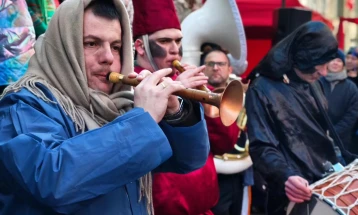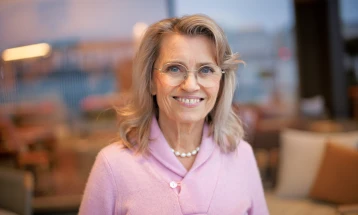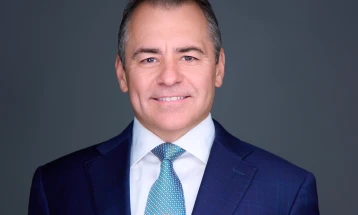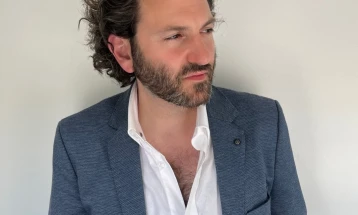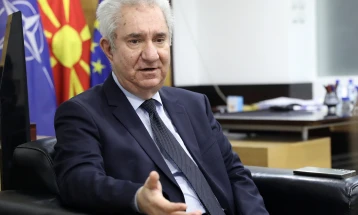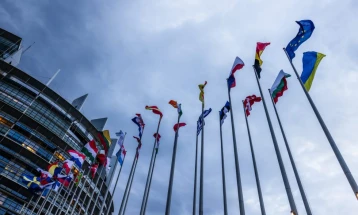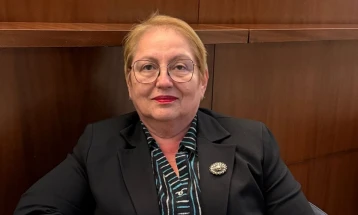Odobescu: Europe, from common dream to political reality
- Amidst animated debates concerning the future of the EU architecture, last week the European Commission published its annual Enlargement Package. I consider this enlargement package a historical one, because it includes, for the first time, the country reports for the three Eastern partners and it reflects a renewed impetus for enlargement as a geo-strategic investment in peace, security, stability and prosperity.
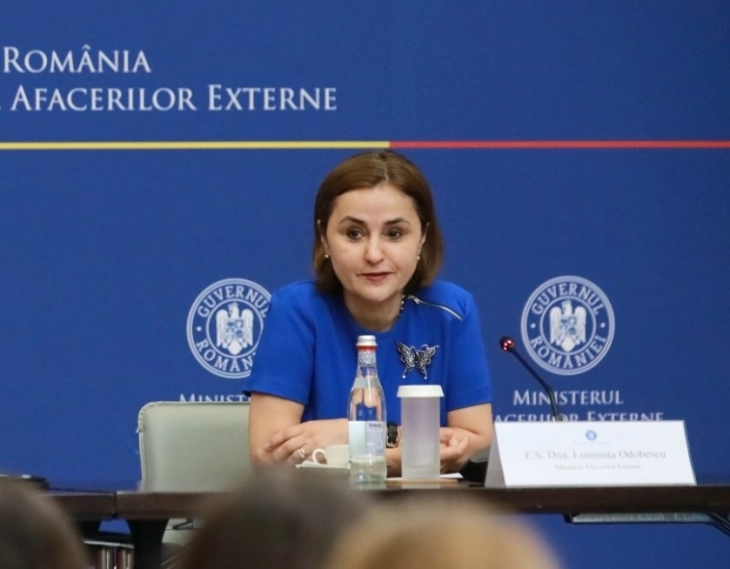
Skopje, 15 November 2023
Amidst animated debates concerning the future of the EU architecture, last week the European Commission published its annual Enlargement Package. I consider this enlargement package a historical one, because it includes, for the first time, the country reports for the three Eastern partners and it reflects a renewed impetus for enlargement as a geo-strategic investment in peace, security, stability and prosperity.
At this current, unprecedented critical juncture, it is the right time for the European Union to send a clear signal to Western Balkan countries, besides our Eastern partners, about what is expected of them on their European paths, in realistic terms. There is no contradiction between the push for “more Europe”, in geographical terms, and the move towards EU institutional reform. These processes are complementary and must go in parallel. For us, it is not an “either/or” type of situation.
Ever since the Russian Federation launched its brutal war of aggression against Ukraine, the world has ceased to be a safe place. We are currently facing a security crisis amplified by worrying developments in the Middle East. Right here, in the Western Balkans, there are also rising tensions. Insecurity and radicalism, migration, the economic situation, and climate change are interconnected and they all pose their fair share of challenges to us.
In the thick of overlapping crises, we remain focused on ensuring that Western Balkans, which are of strategic importance for Romania, for NATO and for the EU, as a whole, as a neighboring region, remain stable and secure, with a clear commitment towards their European future. We have to be honest: the region is often a playground for Russia’s hybrid activities, aggressive propaganda and disinformation. Russia is actively weaponizing identity divisions and political rifts, adding to an already fragile political and security environment. For these reasons, we must work on countering any malign influence and build, enhance and sustain our Western Balkan partners’ overall resilience against such provocations. I am proud to say that over the years, Romania has directly contributed to this goal and became a security provider in the region through its contributions to the EUFOR Althea and KFOR missions. There is still a lot of work to be done, as the challenges the region faces become more complex.
In these somewhat dire circumstances, I do not hesitate to say that there is a bigger than ever need of a stronger Europe, that unity and solidarity are the keys to respond to current challenges. In the current international context, we cannot afford to act in a fragmented way. Therefore, we need a larger EU, not one organized on concentric circles, but one based on Member States that share the same principles, standards and values. Moreover, the enlargement process should take place simultaneously with the EU internal reflection process. One is not a precondition to the other. A united Union 30+, speaking with one voice, is the right answer to the current global context, marked by challenges from competitors that suggest so-called alternative visions and approaches.
However, in order to remain credible, the enlargement process must be predictable and merit-based. Therefore, we need to maintain a clear EU accession process, with detailed and verifiable conditions that must be clear from the outset. I hope that the strong political message of support and encouragement received last week from Brussels by our Western Balkan partners incentivizes them to continue relentlessly on their European paths. The European perspective of both the Western Balkans and of our Eastern partners is the only sound option for long-term peace, stability and prosperity. EU enlargement is the best response not only to Russia's aggression against Ukraine, but also to the need to enhancing security and stability in the Western Balkans.
From Romania’s own EU accession experience, I know that the process of joining the European Union can sometimes be a bumpy and long road. Our Western Balkan partners have to swiftly and sustainably implement internal reforms that are required for accession and to avoid any democratic backsliding, in order to be able to advance faster on their European track. The Copenhagen Criteria remain as valid and relevant today as they were 30 years ago. Rule of law, fight against corruption and organized crime, freedom of the media and journalists, ensuring the protection of human rights, including those of persons belonging to national minorities are mandatory benchmarks. A proactive and positive communication to the public opinion in the Western Balkans is necessary in order to maintain the citizens’ support for the European integration process. They need to understand what the European integration entails, the benefits it brings, as well as to be aware of the significant and constant European support for the region.
Faced with multiple challenges, political elites in the candidate countries need to go the extra mile and stand their ground. Political will and commitment to respecting fundamental values are essential for a successful enlargement process and for a bright future for these countries.
While the fairness of the Copenhagen Criteria, alongside the rigors of the Association Agreements, remain the benchmarks of accession, over the last three decades regional cooperation has also become a valid and essential tool in support of enlargement. Regional cooperation helps overcome political divides in the region and provides the instruments to build up a political culture based on dialogue and compromise. Romania continues to use various fora of regional and sub-regional cooperation to deploy an integrated set of political, economic and operational instruments in support of the Western Balkans.
I genuinely believe that nobody should be left behind. We cannot afford to leave Western Balkans to be led astray by devious and aggressive actors, particularly now, when democracy is on edge and security in the region is very fragile.
The European Union, a project that is constantly developing and deepening, is needed in today’s global landscape more than ever. Romania remains firmly engaged in fostering the European project, its values and its principles. At the same time, this involves both strengthening the EU internally, and working on endowing it with the capacity to act coherently vis-à-vis its neighboring partners.
Minister of Foreign Affairs of Romania, H.E. Mrs. Luminița Odobescu
